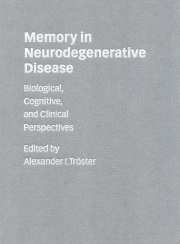Book contents
- Frontmatter
- Contents
- List of contributors
- Preface
- PART I Biological perspectives
- PART II Cognitive perspectives
- PART III Clinical perspectives
- 14 Biological and psychosocial risk factors for dementia and memory loss
- 15 Cross-cultural issues in the neuropsychological assessment of neurodegenerative disease
- 16 Psychometric issues in the clinical assessment of memory in aging and neurodegenerative disease
- 17 The role of memory assessment in the preclinical detection of dementia
- 18 Clinical differentiation of memory disorders in neurodegenerative disease
- 19 The impact of depression on memory in neurodegenerative disease
- 20 Preserved cognitive skills in neurodegenerative disease
- 21 Drug treatment of cognitive impairment in neurodegenerative disease: rationale, current experience and expectations for the future
- 22 Surgical interventions in neurodegenerative disease: impact on memory and cognition
- 23 Memory dysfunction in neurodegenerative disease: ethical and legal issues
- 24 Memory in neurodegenerative disease: clinical perspectives
- Index
22 - Surgical interventions in neurodegenerative disease: impact on memory and cognition
from PART III - Clinical perspectives
Published online by Cambridge University Press: 23 November 2009
- Frontmatter
- Contents
- List of contributors
- Preface
- PART I Biological perspectives
- PART II Cognitive perspectives
- PART III Clinical perspectives
- 14 Biological and psychosocial risk factors for dementia and memory loss
- 15 Cross-cultural issues in the neuropsychological assessment of neurodegenerative disease
- 16 Psychometric issues in the clinical assessment of memory in aging and neurodegenerative disease
- 17 The role of memory assessment in the preclinical detection of dementia
- 18 Clinical differentiation of memory disorders in neurodegenerative disease
- 19 The impact of depression on memory in neurodegenerative disease
- 20 Preserved cognitive skills in neurodegenerative disease
- 21 Drug treatment of cognitive impairment in neurodegenerative disease: rationale, current experience and expectations for the future
- 22 Surgical interventions in neurodegenerative disease: impact on memory and cognition
- 23 Memory dysfunction in neurodegenerative disease: ethical and legal issues
- 24 Memory in neurodegenerative disease: clinical perspectives
- Index
Summary
INTRODUCTION
Surgical interventions for neurodegenerative diseases can be conceived as falling into three broad categories: ablative procedures, transplantation procedures and procedures involving cerebral implantation of chronic electrical stimulation devices. Procedures involving the implantation of drug delivery systems are better considered ‘augmentative procedures’, because signs and symptoms of the disease are not alleviated by the surgical intervention per se. All surgical interventions for neurodegenerative diseases are typically considered potential therapeutic options only after medical therapies either have failed to adequately control a patient's signs and symptoms, or have brought about intolerable side-effects.
Functional neurosurgical treatments have been attempted in numerous neurodegenerative conditions, including Alzheimer's disease (AD), Huntington's disease (HD), Parkinson's disease (PD), multiple sclerosis and amyotrophic lateral sclerosis. Attempts to improve or restore functioning in AD by experimental means such as intracranial implantation of cholinergic drug delivery systems (Harbaugh et al. 1984), or chronic electrical stimulation of the nucleus basalis of Meynert (Turnbull et al. 1985), have failed and been abandoned. AD, amyotrophic lateral sclerosis, multiple sclerosis, HD and PD are among neurodegenerative conditions envisioned as potentially treatable by transplantation of a variety of tissues and cells, including perhaps cells from the patient genetically engineered ex vivo, or genetically engineered cells from other species (xenografts) (e.g. Ffrench-Constant et al. 1994; Aebischer et al. 1996). Research using genetically engineered cells remains directed almost exclusively at experimental animal models of these disorders.
- Type
- Chapter
- Information
- Memory in Neurodegenerative DiseaseBiological, Cognitive, and Clinical Perspectives, pp. 362 - 376Publisher: Cambridge University PressPrint publication year: 1998
- 4
- Cited by

